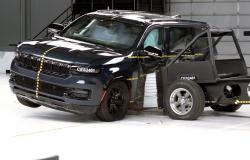The United Auto Workers failed in its attempt to unionize a Mercedes-Benz plant in Alabama, but Friday’s defeat is a good result for a first attempt in a historically anti-union state, professors and analysts said of the world of work.
Workers at the Vance, Alabama, plant voted 56 percent against joining the union. Until the UAW won a landslide victory last month at a Volkswagen plant in Tennessee, the union had repeatedly failed to organize a foreign automaker in the region during its nearly 90 years of existence.
However, the defeat at Mercedes does not stop the UAW from trying to organize other plants in the South, or possibly trying again at Mercedes, said Peter Bible, a former General Motors executive who participated in union negotiations with the UAW.
“They will come back,” he said, adding that the UAW actually garnered more votes than he expected, given the plant’s location in the South.
Workers’ uncertainty about the auto industry’s transition to electric vehicles will only provide more opportunities for the union, Bible said.
Earlier this year, the UAW spent $40 million organizing more than a dozen non-union automakers, including Toyota and Tesla. It is essential that the UAW expand its reach beyond Detroit automakers to maintain its influence within the industry.
At Mercedes, a strong anti-union campaign by the German automaker and southern politicians prompted some to vote against the UAW, workers say. Six U.S. governors, including Kay Ivey of Alabama, signed a letter asking workers to reject the UAW. They said unionization would stunt the growth of the auto industry in the South.
However, Harley Shaiken, a labor law professor at the University of California, Berkeley, noted that the UAW lost twice at VW in Tennessee before winning a landslide victory. The result at Mercedes was similar to an earlier defeat at VW in 2014, when 53% of workers voted against the union.
UAW President Shawn Fain, who spoke after the defeat, did not indicate the union’s next steps but signaled that this was not the end of its efforts. The union and its representatives have already reported progress on organizing at a Hyundai plant in Alabama and at Toyota plants in Missouri and Georgetown, Kentucky.
OVERRATED SUPPORT
“We left nothing on the table,” Mr. Fain said at a UAW union hall near Vance. “There are no regrets to be had in this fight.
“This is a fight between David and Goliath,” he added. “Sometimes Goliath wins the battle. But it’s David who wins the war.”
The UAW called the election after saying a supermajority of workers had signed cards supporting the union, but it clearly lost support in the run-up to the vote.
Jay White, an 18-year Mercedes employee in Alabama, said he thinks the union has overestimated its support. The anti-union campaign really gained momentum in recent weeks, as opponents handed out leaflets and spoke individually to co-workers, he said.
“I just want the best for our team members, for our company and for our jobs,” Mr. White said.
In a region where 2-to-1 losses are regular, Mercedes’ vote was a good first step, said Stephen Silvia, a professor at American University who has published on past organizing campaigns. UAW in the South.
In 2017, Nissan workers at a Mississippi plant rejected the UAW by a large majority. Outside of the auto industry and the UAW, in 2021, workers at an Amazon.com warehouse in Alabama voted against forming a union by a margin of more than 2 to 1. Despite the loss of the Mercedes factory, unionization in the South will remain difficult, according to analysts.
Including the Mercedes plant, there are more than 10 non-union assembly plants in Georgia, Alabama, Mississippi, Kentucky, South Carolina and Tennessee, with automakers such as Toyota, Mazda, Honda, Nissan, BMW, Volvo, Hyundai, Kia and VW.
The loss of Mercedes is one of the first major setbacks for Mr. Fain, who was elected head of the UAW in March 2023. The fiery leader, who spent much of his career as that an electrician at Chrysler – now part of Stellantis – narrowly won the job in the union’s first direct election.
Even with Mercedes’ defeat, it remains a good time for union organizing in the United States, given increased public support for unions, said John Logan, a labor law professor at San State University. Francisco.
“I don’t think we’ll wait a year for the next election in the South,” he said. “This will be another uphill battle. (Reporting by Nora Eckert; Additional reporting by Ben Klayman and Peter Henderson; Editing by Leslie Adler)






